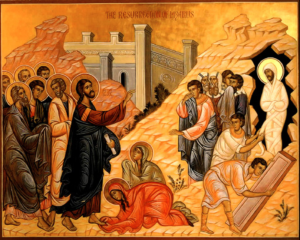The Lord said to His disciples, “If any man would come after me, let him deny himself and take up his cross and follow me. For whoever would save his life will lose it, and whoever loses his life for my sake will find it.” -Matthew 16:24-26
My heart was heavy as I read today’s Gospel. For most Christians, this passage is a familiar one, and many of us have probably reflected on it at one time or another to some degree. We ask ourselves, what does it mean to deny myself? Six thousand miles east of the oversized, comfy chair where I’m writing this, Christians in Iraq, Palestine and Syria are answering the question in ways that most of us could never imagine. Some want to take sides in various conflicts, as if we really know what is truly going on in these regions of the world. In the midst of all of this, the human soul created in the image of God gets relegated to secondary status as it becomes about who’s right and who’s wrong. But there is so much wrong that looking for the right in all of it becomes like looking for a precious gem in a landfill.
Last night I watched a video that showed the scope of the known universe. It began with an aerial view of the Himalayas. I got tears in my eyes as the camera moved outward. The lines that separate nation from nation don’t exist. I began to think about what really does exist. The elderly Christian couple who have just been exiled from the only home they’ve ever known exists. The Christian business owner who has had everything taken away except the clothes on his back exists. The young Christian mother and father who watched as their family’s only water was cruelly poured out onto the ground before their very eyes as they face a 42-mile walk toward exile exist. The group of very young Muslim boys whose minds are being fed the lie that anyone in the world who does not conform to what their sect teaches deserves to die exists. The 1,900 Christians and Muslims seeking refuge together from shell fire in a tiny Greek Orthodox Church in Gaza exist. So many lives are being irreparably damaged right now. So many are taking up crosses that seem unbearable.
We helplessly ask ourselves, what can I do? I write this on the eve of Dormition, which begins the commemoration of the falling asleep of the Mother of God. During this period, Orthodox Christians are called to fast from meat, dairy, wine and oil. A special prayer service, the Paraclesis (supplication), is held daily in our Churches around the world. It has always been a time of renewal and contemplation for me. For many of us, it is a difficult time of year to fast or attend Church as we are traveling or for other various reasons. However, I want to challenge you to try to commit to taking some extra time each day, for the next 15 days, to pray for our brothers and sisters suffering around the world. If you can’t attend Church, pray through the Paraclesis, which can be found here. Its words are so fitting for everything that is currently happening. In Galatians 6:2 St. Paul tells us to “bear one another’s burdens, and so fulfill the law of Christ.” Maybe giving up that little bit of extra time each day is the cross that Christ is asking you and me to bear right now. I leave you with Psalm 142, the first Psalm which is prayed at the beginning of the Small Paraclesis. May you have a blessed fast.
“O Lord, hear my prayer, give ear to my supplications in Your truth; hear me in Your righteousness. Do not enter into judgment with Your servant, for in Your sight no one living is justified. For the enemy has persecuted my soul; he has crushed my life to the ground; he has made me dwell in darkness like those who have long been dead, and my spirit is overwhelmed within me; my heart within me is distressed. I remembered the days of old; I meditated on all Your works: I pondered on the work of Your hands. I spread out my hands to You; my soul longs for You, like a thirsty land.
Hear me quickly, O Lord; my spirit fails. Do not turn Your face away from me, lest I be like those who go down into the pit. Cause me to hear Your mercy in the morning, for in You I have put my trust. Cause me to know, O Lord, the way in which I should walk, for I lift up my soul to you. Rescue me, Lord, from my enemies; to You have I fled for refuge. Teach me to do Your will, for you are my God. Your good Spirit shall lead me in the land of uprightness. For Your name’s sake, O Lord, you shall quicken me. In Your righteousness you shall bring my soul out of trouble, and in Your mercy, You shall utterly destroy my enemies. And You shall destroy all those who afflict my soul; for I am Your servant.”
